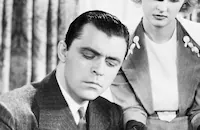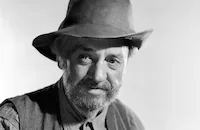The Arkansas Traveler
Cast & Crew
Alfred Santell
Bob Burns
Fay Bainter
John Beal
Jean Parker
Lyle Talbot
Film Details
Technical Specs

Synopsis
The Arkansas Traveler, an itinerant printer, returns to a small town to help save The Daily Record , a newspaper started by Mr. Allen, an old friend who is now deceased. The paper is run by Allen's widow Martha and her son Benny. The day the Traveler arrives, Johnnie Daniels, son of the town's corrupt mayor, returns after a three-year absence and learns his mother died just three days before. Although Johnnie refuses to see his father, the Traveler convinces the friendly constable to arrest Johnnie for stealing his watch in order to get Johnnie to stay. Wealthy Matt Collins, who runs the town's politics, is planning to build a dam with the taxpayers' money to benefit his own electricity business. Collins orders the constable to release Johnnie to save the mayor's reputation, but Johnnie refuses Collins' help and goes to work on the Allens' paper, hoping to use it as a vehicle for exposing Collins' hidden agenda regarding the dam bond issue and the mayoral election. At Collins' orders, local businessmen pull their ads from the paper, and Collins offers to buy the paper from Martha. She refuses to sell and the Traveler and Johnnie write an editorial exposing Collins' corruption. Johnnie's father Homer then visits, asking him to join forces with him and Collins, but Johnnie says he plans to fight them. Collins, meanwhile, befriends Martha's daughter Judy and when the Traveler continues to fight Collins, Judy accuses him of meddling, and he begins packing his bags. Judy apologizes, however, and the Traveler explains he came to town to pay a debt to her father. When Judy reveals to her mother her yearning for important city life, Martha explains she, too, had that longing, but stuck with her husband's dream of building a big newspaper. The Traveler becomes a matchmaker for Judy and Johnnie, who love each other silently. Just as the constable tells Martha he must repossess her presses on account of debt, the Traveler finds Allen's old blueprint for a radio station. The Traveler knows the Allens' license for a radio station is not yet expired and that Collins cannot build one until the Allen license runs out. The Traveler convinces Collins he has quit work at the Allens' paper and needs a generator for a cotton gin in another town. The Allens lose their paper and for a while believe the Traveler has betrayed them, but he returns with dozens of unemployed men to build a radio station in time for the mayoral election. The Traveler kidnaps Collins and Daniels and sends them out of town in the back of a van. With Johnnie's electrical engineering talents and the Traveler's receiving tower, the townspeople and the itinerants build a radio station in one night. At dawn the day of the election, the Allens stage their first radio broadcast, which consists of Johnnie's proposal to Judy. When the polls open, Johnnie is elected mayor. The Traveler is about to hop a train out of town when the constable arrests him for stealing Johnnie's watch.

Director
Alfred Santell
Cast

Bob Burns

Fay Bainter

John Beal

Jean Parker

Lyle Talbot

Irvin S. Cobb

Dickie Moore

Porter Hall

Joseph Crehan
Henry Roquemore
John T. Murray
Billy Cook
Dorothea Wolbert

James Flavin
Ralph Remley
Bernard Suss
A. S. Byron
Hallene Hill
Walter Soderling
Henry Martin
Harry Hayden
Edmund Elton
Harry Tyler
Harry Holman
Max Wagner
Murray Alper
Eddie Dunn
Frank Austin
Roger Gray
Bert Roach
Alec Craig
Lew Payton
George Guhl
Emma Tansey
Ethel Clayton
Norah Gale
Ruth Rogers
Janet Waldo
Dorothy White
Paula De Cardo
Marie Burton
Harriette Haddon
Dorothy Dayton
Helaine Moler
Judith King
Joyce Mathews
Marion Weldon
Jeff Davis
Crew
George M. Arthur
Roland Asher
Jack Cunningham
Hans Dreier
A. E. Freudeman
Earl Hedrick
Don Johnson
William Lebaron
Harry Lindgren
Mary C. Mccall Jr.
Boris Morros
George Sessions Perry
Viola Brothers Shore
Leo Tover
Paul Weatherwax
Adolph Zukor

Film Details
Technical Specs

Quotes
Trivia
Presented as part of the Kraft Music Hall of the Air Program (Red Network of NBC) on Thursday, 6 October 1938, World-Premiered in Little Rock, Arkansas on 6 October 1938.
Notes
This film was a "Movie Quiz $250,000.00 Contest" picture; no further information on the contest has been found. The film is dedicated to William Allen White, an editor from Emporia, Kansas. The film opens with a quotation from Life: "To the small-town man who envies the glamour of the city, he is living assurance that small-town life May still be profitable...to the city man who looks back with longing on a small-town youth, he is a living example of simplicity, kindliness and common sense." According to files in the AMPAS Library, early writing credits dated July 22, 1938 included Mary C. McCall, Jr. as a third screenwriter, but revised credits resulting from final rewriting dated August 23, 1938, eliminated her from the screen. Records dated September 21, 1938 list Walter DeLeon as a contributing writer, but he receives no credit on the screen. Motion Picture Herald states that Jeff Davis was "famed as 'King of the Hoboes.'"












